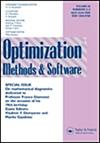单调NCP的非精确内点法
IF 1.4
3区 数学
Q3 COMPUTER SCIENCE, SOFTWARE ENGINEERING
引用次数: 7
摘要
本文给出了求解单调非线性互补问题的非精确内点法。我们证明了Kojima, Noma和Yoshise提出的关于该方法的精确版本的理论可以用于建立非精确形式的全局收敛性。然后在一些更强的假设下证明了该算法的局部超线性收敛性。在问题满足标度Lipschitz条件的假设下,研究了算法的复杂度。证明了该算法的可行版本是多项式版本,而不可行版本以线性速率全局收敛。本文章由计算机程序翻译,如有差异,请以英文原文为准。
An inexact interior point method for monotone NCP
In this paper we present an inexact Interior Point method for solving monotone nonlinear complementarity problems. We show that the theory presented by Kojima, Noma and Yoshise for an exact version of this method can be used to establish global convergence for the inexact form. Then we prove that local superlinear convergence can be achieved under some stronger hypotheses. The complexity of the algorithm is also studied under the assumption that the problem satisfies a scaled Lipschitz condition. It is proved that the feasible version of the algorithm is polynomial, while the infeasible one is globally convergent at a linear rate.
求助全文
通过发布文献求助,成功后即可免费获取论文全文。
去求助
来源期刊

Optimization Methods & Software
工程技术-计算机:软件工程
CiteScore
4.50
自引率
0.00%
发文量
40
审稿时长
7 months
期刊介绍:
Optimization Methods and Software
publishes refereed papers on the latest developments in the theory and realization of optimization methods, with particular emphasis on the interface between software development and algorithm design.
Topics include:
Theory, implementation and performance evaluation of algorithms and computer codes for linear, nonlinear, discrete, stochastic optimization and optimal control. This includes in particular conic, semi-definite, mixed integer, network, non-smooth, multi-objective and global optimization by deterministic or nondeterministic algorithms.
Algorithms and software for complementarity, variational inequalities and equilibrium problems, and also for solving inverse problems, systems of nonlinear equations and the numerical study of parameter dependent operators.
Various aspects of efficient and user-friendly implementations: e.g. automatic differentiation, massively parallel optimization, distributed computing, on-line algorithms, error sensitivity and validity analysis, problem scaling, stopping criteria and symbolic numeric interfaces.
Theoretical studies with clear potential for applications and successful applications of specially adapted optimization methods and software to fields like engineering, machine learning, data mining, economics, finance, biology, or medicine. These submissions should not consist solely of the straightforward use of standard optimization techniques.
 求助内容:
求助内容: 应助结果提醒方式:
应助结果提醒方式:


